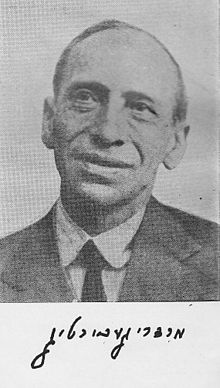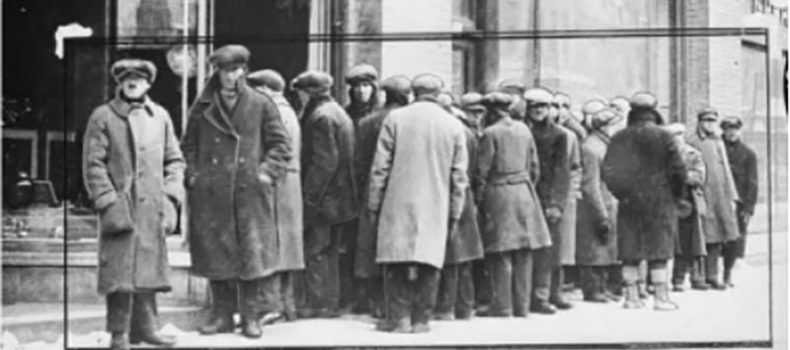“Arbetsloze Marsh”, written by Mordechai Gebirtig in 1938
Lyrics
Eyns, tzvey, dray, fir,arbetlose zenen mir,
nisht gehert khadoshim lang,
in fabrik der hamer-klang,
s’lign keylium lang farguezn,
‘snemt der shavert sey shoyn fresn,
geyen mir arum in gas, vi di guevirim pust-un-pas.
Eyns, tzvey, dray, fir,arbetlose zenen mir,
on a begued on a heym,
undzer bet iz erd un leym,
hot nor ver vos tsu guenisn,
taylt men zikh mit yedn bizn,
vaser vi d’gvirim vayn mir in zikh arayn.
Eyns, tzvey, dray, fir, arbetlose trit nokh tri,
yorn lang gearbet shver,
un gueshaft altz mer un mer,
heyzer, shleser, shtet un lender,
far a hoifele farshvender,
undzer loin derfar iz vos?,
hunger, noyt un arbetloz.
Eyns, tzvey, dray, fir,
Ot azoy marshirn mir,
arbetloze shrit nokh shrit,
un mir zinguen zikh a lid.
Fun a land a velt a naye,
vu es voynen mentshn fraye,
arbetloz iz kayn shum shand,
in dem nayem frayen land,
in derm nayem frayen land!
Yiddish
איינס, צוויי, דרײַ, פֿיר,
אַרבעטלאָזע זענען מיר,
יאָרן לאַנג געאַרבעט שווער,
און געשאַפֿט אַלס מער און מער,
הײַזער, שלעסער, שטעט און לענדער,
פֿאַר אַ הייפֿעלע פֿאַרשווענדער,
אונדזער לוין דערפֿאַר איז וואָס,
הונגער נויט און אַרבעטלאָז.
איינס, צוויי, דרײַ, פֿיר,
אָט אַזוי מאַרשירן מיר,
אַרבעטלאָזע שריט נאָך שריט,
און מיר זינגען זיך אַ ליד,
פֿון אַ לאַנד, אַ וועלט אַ נײַע
וואו עס וווינען מענטשן פֿרײַע,
אַרבעטלאָז איז קיין שום שאַנד,
אין דעם נײַעם פֿרייען לאַנד,
אין דעם נײַעם פֿרייען לאַנד!
Mordechai Gebirtig

Mordechai Gebirtig (Yiddish: מרדכי געבירטיג), born Mordecai Bertig (4 May 1877 – 4 June 1942), was an influential Yiddish poet and songwriter of the interwar period. He was shot by Germans in the Kraków Ghetto, which was set up by Nazi Germany formally on 3 March 1941 in the new General Government district of occupied Poland, during the Holocaust.
Mordechai Gebirtig was born in Kraków under the Austrian Partition, and lived in its Jewish working-class quarter all his life. He served for five years in the Austro-Hungarian army. Gebirtig became a renowned folk artist in Yiddish literature and song while in Kraków. He was self-taught in music, played the shepherd’s pipe, and tapped out tunes on the piano with one finger.[1] He earned his livelihood as a furniture worker; while music and theatre were his avocations. His life ended in the Nazi shooting action carried out in the Kraków Ghetto on the infamous “Bloody Thursday” of June 4, 1942.
Gebirtig belonged to the Jewish Social Democratic Party, a political party in Galicia which merged into the Jewish Labour Bund after World War I. The Bund was a Yiddishist proletarian socialist party, which called for Jewish cultural autonomy in a democratic Second Republic.
Music
From 1906 he was a member of the Jewish Amateur Troupe in Kraków. He also wrote songs and theater reviews for Der sotsial-demokrat, the Yiddish organ of the Jewish Social-Democratic Party. It was in such an environment that Gebirtig developed, encouraged by such professional writers and Yiddishist cultural activists as Avrom Reyzen, who for a time lived and published a journal in Krakow. Gebirtig’s talent was his own, but he took the language, themes, types, tone, and timbre of his pieces from his surroundings, in some measure continuing the musical tradition of the popular Galician cabaret entertainers known as the Broder singers, who in turn were beholden to the yet older and still vital tradition of the badchen’s (wedding jester’s) improvisatory art.
Style of folk songs
He published his first collection of songs in 1920, in the Second Polish Republic. It was titled Folkstimlekh (‘of the folk’). His songs spread quickly even before they were published, and many people regarded them as folksongs whose author or authors were anonymous. Adopted by leading Yiddish players such as Molly Picon, Gebirtig’s songs became staples of numerous regular as well as improvised theatrical productions wherever Yiddish theatre was performed. It is not an exaggeration to say that Gebirtig’s songs were lovingly sung the world over.
Videos
Yiddish
“Arbetsloze Marsh”, by mordekhay gebirtig
“Arbetsloze Marsh”, Daniel Kahn
English – Yiddish
Daniel Kahn English – Yiddish
Vladimir Lenin in yiddish, from Germany
Bolshewiks
Arbetlose Marsch /Arbeitsloser Marsch – Yiddish and German workers’ song- Isabel Frey
German transliteration


1 thought on ““Arbetsloze Marsh”, written by Mordechai Gebirtig in 1938”
gracias por la oprtunidad de escuchar musica jidish